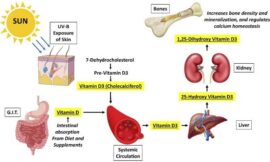In the intricate symphony of human health,few players are as vital yet as quietly influential as omega-3 fatty acids. These essential fats, woven into the fabric of our diets and our cells, hold a profound connection to one of our most cherished assets: the brain. From nurturing cognitive progress to perhaps shielding against neurodegenerative decline, omega-3s have captured the attention of scientists and health enthusiasts alike.This article delves into the multifaceted role of omega-3 fatty acids in brain health, unraveling the science behind their impact and exploring why these powerful nutrients deserve a spotlight in our daily lives.
The Impact of Omega-3 Fatty Acids on Cognitive Function
Scientific evidence highlights that Omega-3 fatty acids, particularly DHA (docosahexaenoic acid), are fundamental to maintaining and enhancing brain health. DHA, wich forms a significant part of the brain’s gray matter, supports the structural integrity and fluidity of neuronal membranes. This enhancement improves synaptic plasticity,a key mechanism underlying learning and memory. Additionally, Omega-3s modulate inflammatory processes in the brain; their anti-inflammatory properties help protect against neurodegenerative diseases such as Alzheimer’s and Parkinson’s. Incorporating a diet rich in Omega-3s has been linked to better cognitive performance, attention, and slower cognitive decline as we age.
Key benefits of Omega-3s on cognitive function:
- Improved communication between brain cells.
- Enhanced memory consolidation and recall.
- reduction of oxidative stress and inflammation.
- Support in mood regulation and mental health.
- Potential protection against dementia progression.
| Omega-3 Type | Brain Benefit | Primary Food Sources |
|---|---|---|
| DHA | Structural support and neuroplasticity | Fatty fish, algae |
| EPA | Anti-inflammatory and mood regulation | Salmon, mackerel |
| ALA | Precursor to DHA and EPA | Flaxseeds, walnuts |
For those interested in exploring the scientific foundations further, resources such as the National Institutes of Health and PubMed Central offer extensive research collections on Omega-3 fatty acids and cognition.

Understanding the Mechanisms Behind Omega-3 and brain Connectivity
Omega-3 fatty acids, predominantly found in fish oil and certain plant sources, are vital for maintaining and enhancing the brain’s complex network of connections. These essential fats are integrated into the phospholipid bilayer of neuronal membranes, promoting fluidity and facilitating effective signal transmission between neurons. This structural role supports synaptic plasticity—the brain’s ability to adapt and reorganize—which underpins learning and memory functions. Research indicates that omega-3s modulate neurotransmitter release and reduce neuroinflammation, creating an optimal surroundings for improved cognitive function and resilience against neurodegenerative diseases.
Mechanistically, omega-3s influence brain connectivity through multiple pathways:
- Enhanced Myelination: They contribute to the formation of myelin sheaths, accelerating neural signal conduction.
- Anti-inflammatory Effects: By modulating cytokine production,omega-3s reduce chronic inflammation,a common factor in cognitive decline.
- Neurogenesis Promotion: stimulating the proliferation of new neurons, especially in the hippocampus, which is critical for memory formation.
| Mechanism | Impact on Brain Connectivity |
|---|---|
| Membrane Fluidity | Improved signal transmission efficiency |
| Synaptic Plasticity | Enhanced learning & memory |
| Neuroinflammation Reduction | Preservation of cognitive function |
For a deeper dive into the role of omega-3s on brain health, the National institutes of Health provides complete research articles.Additionally, the Mayo Clinic offers accessible summaries on omega-3 supplementation and cognitive benefits. To explore the biochemical aspects, frontiers in Aging Neuroscience presents up-to-date scientific insights.

Incorporating Omega-3 Rich Foods into Your Daily Diet
Boosting your daily intake of omega-3 fatty acids can be both delicious and simple. Incorporate fatty fish like salmon,mackerel,and sardines into your meals at least twice a week to enjoy their brain-boosting benefits. For those preferring plant-based options, chia seeds, flaxseeds, and walnuts serve as excellent sources of alpha-linolenic acid (ALA), a type of omega-3.Adding these to your breakfast or snacks—think smoothies, oatmeal, or salads—can seamlessly enhance your nutrient profile. Don’t overlook fortified foods such as certain brands of eggs and dairy, which provide a convenient omega-3 boost without altering your meal plan drastically.
When planning your grocery list, aim for a balance of these options to maximize the health advantages. Use this speedy reference to streamline your choices:
| Food Source | Omega-3 Type | Ideal Frequency |
|---|---|---|
| Salmon | EPA & DHA | 2-3 times weekly |
| Chia Seeds | ALA | Daily |
| Walnuts | ALA | Several times weekly |
| Flaxseeds | ALA | Daily |
| Fortified Eggs | EPA & DHA | Regularly |
For further details on omega-3 nutrition and brain health, reputable sources like the
Guidelines for Supplementing Omega-3 to Support Mental Wellbeing
To optimize the mental health benefits of omega-3 fatty acids, it’s crucial to pay attention to dosage, quality, and consistency. Many experts recommend a daily intake of at least 500 mg of EPA and DHA combined for general cognitive support,while individuals dealing with mood disorders may need higher amounts under medical supervision. When choosing supplements, prioritize those with third-party testing to ensure purity, potency, and absence of harmful contaminants such as mercury or pcbs. Additionally, incorporating omega-3 rich foods like fatty fish into your diet can enhance absorption and provide a broader spectrum of nutrients essential for brain function.
Establishing a routine is key—taking omega-3 supplements alongside meals containing healthy fats can improve bioavailability. Keep in mind that benefits may take several weeks to manifest, so patience and consistency are vital. Below is a quick reference guide on best practices:
- Consult a healthcare professional before starting any supplementation, especially if on medication.
- Choose high-quality, purified fish oil products sourced sustainably.
- Combine supplementation with a balanced diet rich in omega-3 sources such as walnuts and flaxseeds.
- Monitor any changes in mood or cognitive function and adjust dosage accordingly.
| Supplement Form | Advantages | Recommended Use |
|---|---|---|
| Fish Oil Capsules | High EPA/DHA content, widely studied | Daily with meals |
| Algal Oil | Vegan friendly, sustainable | Good option for vegetarians |
| Liquid Omega-3 | Adjustable dosage, easy absorption | Ideal for customized regimens |





